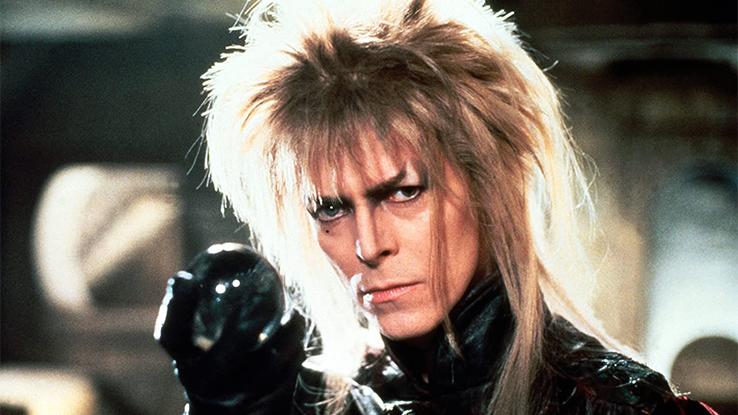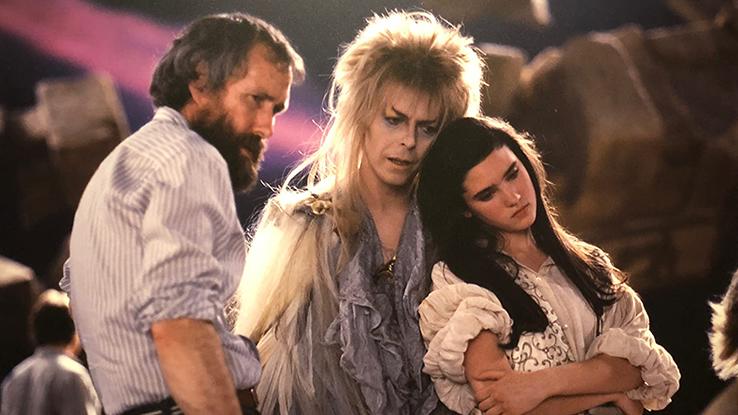
Hollywood seems determined to profit from remakes and sequels that movie makers have no business writing, producing or releasing. Rather than working hard to generate new films — ones with novel plot devices, leads and stories from underrepresented communities and compelling cinematic visions, for example — the bigwigs of the American film industry are on a mission to quickly ruin any remnant of millennial childhood nostalgia.
So, it is with a heavy heart — and in recognition that January 10, 2022, marks six years since the passing of the absolutely legendary and incomparable David Bowie — that I am forced to address the announcement of a Labyrinth sequel. Now, does the original film require, necessitate or even hint at a sequel? Is the lead actor from the original movie prepared to make an appearance? Is the original director still available? The answer to these questions is a single, resounding “NO.” And yet, here we are. Sigh.
Allow me to take a brief moment to discuss why a Labyrinth sequel is an awful, terrible, no-good idea.
A Bowie-Less Labyrinth Sequel Will Be a Travesty
The upcoming Labyrinth sequel faces some tough challenges. For starters, it’s going to be missing its eternal, androgynous Jareth the Goblin King — a.k.a. the incomparable David Bowie. In 2016, the iconic genre- and gender-bending rock star lost a long battle with liver cancer. His failing health was a well-kept secret, and fans and admirers from all over the world mourned his untimely passing.

If you believe that Bowie’s absence from a Labyrinth sequel is more a casting challenge than a reason to cancel the entire project, I’d recommend that you go back and watch the original 1986 film. Bowie’s presence extends beyond his insanely flustered hairdo, gigantic codpiece and cool charismatic demeanor — the man also wrote and performed more than half of the movie’s soundtrack.
Seeing Bowie perform as Jareth is much like watching him as Ziggy Stardust. It can be challenging to separate the truth from the fiction of these performances, as Bowie becomes so engrossed in his characterization that he simply ceases to be himself. Even as an adult, it’s difficult to watch Jareth the Goblin King prance, dance and sing without occasionally stopping to think, “Wow. That really is David Bowie. And, yes, I will ‘Dance the Magic Dance’ down my hallway.”
I’m sorry, but it’s impossible for a casting director to find a multitalented actor/musician to fill Bowie’s shoes in an upcoming sequel. It’s also a challenge to imagine any viable reason why the original — seemingly immortal — Goblin King would have suddenly changed form. This type of confusion only deepens when considering what might become of the Labyrinth’s creatures.
The Absence of Jim Henson’s Creative Genius
Jim Henson, the mastermind behind the Muppets, directed the original Labyrinth film. His masterful puppetry showed a depth of skill unmatched by rival puppeteers, and in a time without impressive CGI graphics, he was one of the go-to guys for practical special effects. Sadly, Henson passed away in 1990. Since that time, there have been no less than five theatrical releases with his charming Muppet characters — and they’ve all been awful.

Some might take those movies as a sign that Henson’s absence is no big deal when attempting to make a sequel. They would be incredibly wrong. A Labyrinth sequel without Bowie AND Jim Henson would be like a Mrs. Doubtfire sequel without Robin Williams. (Don’t you dare, 20th Century Fox!) Just stop thinking about it and appreciate this magic for what it is!
Making a sequel to the Labyrinth film without using Henson’s puppets would be like George Lucas abandoning practical puppetry from his Star Wars franchise in favor of poorly-generated computer graphics. Oh…that’s already happened, and the response has been less-than-stellar. Fans who have grown up watching a specific film are bound to feel slighted, misunderstood or just plain cheated when that film ends up lost in technological translation.
Not convinced that fans don’t want a CGI-heavy Labyrinth remake? Take a look at how The Lion King fanbase (and critics) reacted to the CGI “live-action”‘ Disney remake. Here’s a spoiler: They didn’t like it.
A Project Fueled by Profits, Not Passions
All of this begs the question, “Why are these executives green-lighting so many ’80s remakes and sequels right now?” Unfortunately, the answer lies in nostalgia-based profit. Academics have long studied consumer behavior, and it seems that recent studies have not fallen on deaf ears.

In 2014, the Journal of Consumer Research published findings on the connection between nostalgia and money-spending habits. They discovered that people are more willing to spend money when they’re feeling sentimental or nostalgic. Advertising executives and film producers have taken this tidbit of information and run with it.
That’s why our current film industry is flooded with remakes and unasked-for sequels, especially to icons from the 1980s and 1990s. Children from that era are now full-fledged adults with existential dread about the future as climate change, pandemics and political chaos leave generations clamoring for familiar, comforting nostalgia.
But rather than re-releasing original footage on updated media (think Blu-ray and 4K downloads), the film industry would rather take existing intellectual property and rebrand it for the younger generation. In most cases, the result is an alienated original audience and a disinterested youth. This is all done in the name of and for the sake of profit.
So Please, Leave This Gem of a Picture Alone
A movie shouldn’t be pre-judged as good or bad, of course, but should instead be judged by its merit, reception and lasting impact. Still, even the most advanced hologram technology could not revive Bowie’s onscreen presence (NOR SHOULD IT). And no amount of CGI could replace the authenticity and wonder of Henson’s creations.

The only thing that could remain consistent between the original Labyrinth film and its proposed sequel is its main screenwriter, Terry Jones (of Monty Python fame and glory). But as of this moment, there’s no word from the aging Brit as to his possible involvement in writing a sequel.
As a result, there’s little hope that a Labyrinth 2 would be anything more than a shameless, soulless cash grab aimed at adults who long for the simpler, stranger world that lay before them during the ’80s. Any project based on profit, not passion, is doomed to fail, and that’s why I’m not looking forward to the mess of a sequel that undoubtedly lies ahead.

 Michael Kasian-Morin
Michael Kasian-Morin




